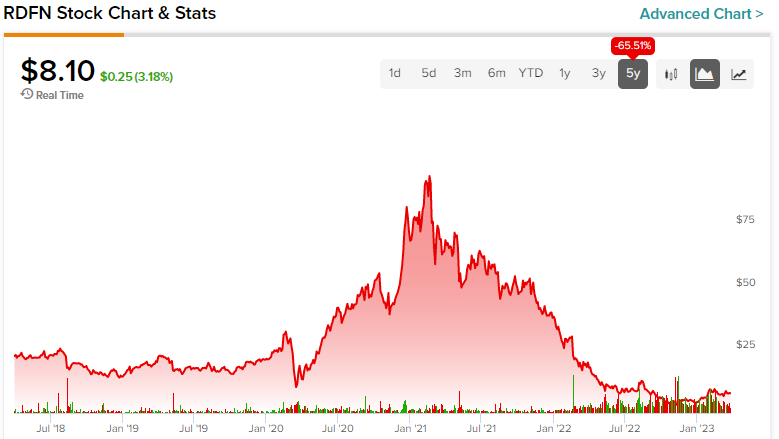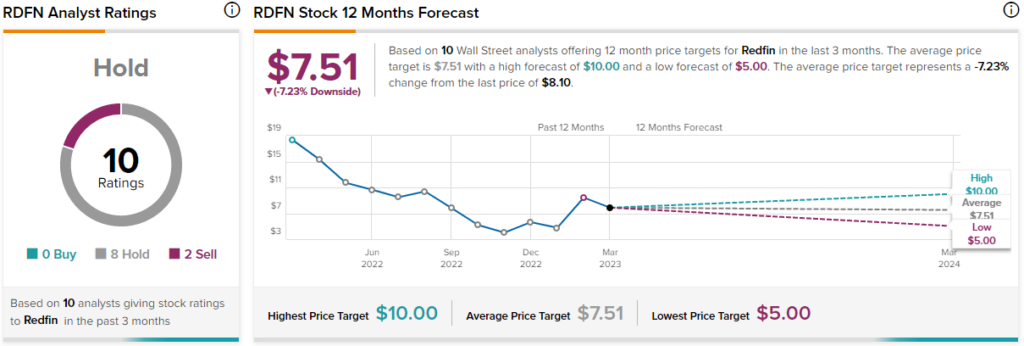While nothing stands as truly inevitable, a sinking feeling surrounds real estate broker Redfin (NASDAQ:RDFN). No matter what, bad news probably awaits RDFN stock. Fundamentally, the Federal Reserve must make monetary policy choices in the months and years ahead. Still, whatever it chooses will likely impose pressure on housing-related investments. Therefore, for the time being, I am bearish on RDFN.
Stay Ahead of the Market:
- Discover outperforming stocks and invest smarter with Top Smart Score Stocks
- Filter, analyze, and streamline your search for investment opportunities using Tipranks' Stock Screener

The Broader Economic Outlook is Discouraging
Before getting into the granularity of why the Fed’s confounding dilemma poses a poor outlook for RDFN stock, it’s worth considering the broader framework, which is also discouraging. Primarily, the failure of two major U.S. banks imposes not-unjustified anxieties regarding financial stability. Therefore, the words of TipRanks contributor Yulia Vaiman sound ominous because they’re likely accurate: swimming in high tide might get you drowned.
Furthermore, the implosion of the financial enterprises sends a chill to investors of all market categories. True, the Fed, the Treasury, and the Federal Deposit Insurance Corporation (FDIC) issued a joint statement, reassuring depositors of the affected entities that their money would be safe. However, the agencies also stated that shareholders will receive no protection.
That’s to be expected – common shareholders often stand last in line for liquidation proceedings. At the same time, the banking crisis materialized like a thief in the night. Given that banks could seemingly fail overnight, it’s also possible that contagion could devastate other non-finance sectors.
Under such a risky backdrop, the incentive to stay exposed to risk-on assets diminishes substantially. Therefore, just from a risk/reward perspective, the idea of holding – let alone aggressively bidding up – RDFN stock appears treacherous.
Unfortunately, wider economic circumstances may convince market participants to avoid the name altogether.
RDFN Stock Faces a Tough Sentence Either Way
For certain states, condemned prisoners can choose between lethal injection or a sanctioned alternative. Of course, this macabre decision offers no bearing on the ultimate sentence, and to avoid such a fate, the prisoner should have made better life decisions. It’s an ugly correlation, but it’s also fitting for RDFN stock. Whatever direction monetary policy chooses to go – inflationary (dovish) or deflationary (hawkish) – it’s bad news for Redfin.
While the Fed recently hiked interest rates by 25 basis points (0.25%), it may choose to pause rate hikes or even take a dovish, accommodating approach. If the banking crisis worsens, in theory, the central bank has an obligation to spark greater liquidity in the system. Under this scenario, RDFN stock and many other publicly traded securities may jump higher.
For Redfin, lower interest rates would translate to lower mortgage rates. Naturally, this framework would improve affordability on the back end (i.e. financing). However, it would hurt the front end as the underlying inflationary forces boost home prices. So, accommodation represents a no-go for RDFN stock.
However, what about the opposite scenario? If the Fed continues to raise rates to combat inflation, that will almost surely improve the front-end dilemma. Pricing would have to come down so that serious home sellers can be competitive. On the other hand, the back end would suffer damage as mortgage rates rise, hurting affordability.
Also, a hawkish monetary policy will likely worsen mass layoffs. Therefore, RDFN stock would likely face a diminished total addressable market.
In hindsight, the Fed (and Washington broadly) should have made better life decisions before committing the crime of aggressive stimulus. At this point, though, there’s nothing that anyone can do.
Financials Don’t Provide Much Confidence
In the day-to-day rumblings, it’s always possible that an embattled entity like RDFN stock may rise for any number of reasons (or non-reasons). However, over time, the fundamentals matter. With Redfin, the quantitative data doesn’t look at all enticing.
For instance, regarding its balance sheet, Redfin’s equity-to-asset ratio sits at 0.07 times, ranked worse than 94.3% of the real estate industry. Also, its Altman Z-Score (a solvency metric) comes in at 0.88, indicating a distressed enterprise. As well, on a trailing-year basis, Redfin’s operating and net margins sit near -14% each. It’s a mess.
Now, one stat that does stand out positively is its three-year revenue growth rate (on a per-share basis). Here, the stat pings at 35.5%, which appears impressive. However, when investors drill into the data, they’ll find that, for the most part, between Q4 2021 and Q4 2022, revenue had been steadily declining.
In other words, it’s unlikely that Redfin will continue to hold this 35.5% stat.
Is RDFN Stock a Buy, According to Analysts?
Turning to Wall Street, RDFN stock has a Hold consensus rating based on zero Buys, eight Holds, and two Sell ratings. The average RDFN stock price target is $7.51, implying 7.2% downside potential.

The Takeaway: RDFN Stock Really Has No Options Available
RDFN stock will probably face more erosion of its market value, but it’s not the underlying enterprise’s fault. With a poor choice made by the Federal Reserve back in early 2020, Redfin can only hope that it made enough money in the first two years of the crisis to ride out the consequences. Unfortunately, however, that’s not a great narrative for prospective investors.
















